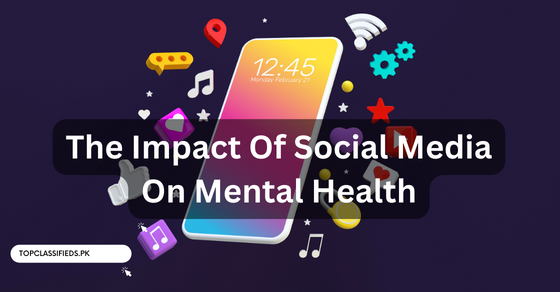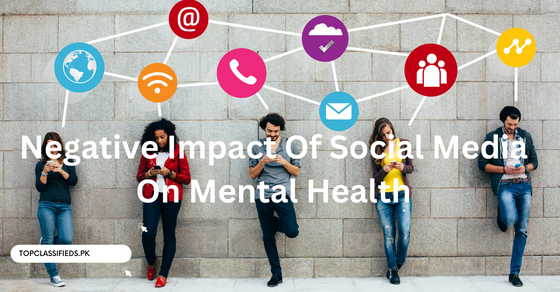The impact of social media on mental health – Ultimate Guide

Social Media has become an integral part of our daily lives, with platforms like Facebook, Instagram, and Twitter serving as primary sources of communication and information for many people.
While digital media has its benefits, such as connecting people across the globe and providing a platform for self-expression, it also has the potential to impact our mental health negatively.
In this blog post, we will explore the effects of social media on mental health.
The Effects Of Social Media On Mental Health:
Social media can have both Positive and Negative Effects on Mental Health.
We will explore both the positive effects of digital media on mental health as well as the negative impact it can have.
Positive Effects of Social Media
Social media has become an integral part of our daily lives, connecting us with friends and family, providing a platform for self-expression, and keeping us informed about the world.
While the adverse effects of online media on mental health are widely discussed, it’s also important to acknowledge the positive impact it can have on our mental well-being. In this blog post, we will explore the positive effects of social media on mental health and how you can use it to improve your overall well-being.
One of the social media’s most apparent benefits is its sense of connection and community. For many people, digital media serves as a valuable source of support and validation, especially for those who may not have a robust support system in their offline lives.
Social media can also provide a platform for self-expression and creativity, allowing individuals to share their thoughts, feelings, and experiences with others. It can help individuals feel more connected and less alone, even physically isolated.
Another positive effect of social media is its ability to provide access to information and resources that can improve mental health. For example, you can use online to connect with mental health professionals, support groups, and organizations that provide resources for individuals experiencing mental health challenges.
It can make it easier for people to access the help they need and to educate themselves about mental health conditions.
Social media can also provide opportunities for personal growth and development. For example, you can use digital media to connect with people with similar interests and passions, leading to new friendships and opportunities for learning and growth.
Social media can also help build self-esteem and self-confidence by providing a platform to showcase one’s talents and abilities. It can be particularly beneficial for people with difficulty expressing themselves in person.
Negative Impact Of Social Media

Social media has become an integral part of our daily lives, connecting us with friends and family, providing a platform for self-expression, and keeping us informed about the world. However, as we spend more and more time on these platforms, we must consider the negative impact social media can have on our mental health.
One of the most significant adverse impacts of digital media is the feeling of isolation and loneliness it can create. Spending too much time on social media can lead to feelings of isolation, as individuals may begin to compare their lives to the curated and filtered versions of others.
Seeing images of other people’s seemingly perfect lives can make an individual feel like they are missing out on something or that their life is less fulfilling. It can lead to depression, low self-esteem, and anxiety.
Another adverse effect of social media is its impact on self-esteem and body image. Constant exposure to pictures of “perfect” bodies and lives can lead to feelings of inadequacy and low self-esteem.
Digital media can also perpetuate harmful stereotypes and reinforce opposing body image ideals. It can lead to individuals feeling self-conscious about their appearance and can contribute to the development of eating disorders and body dysmorphia.
Another negative impact of social media is its impact on our ability to focus and be productive. It can be difficult to disconnect from online media, which can lead to procrastination and decreased productivity. The constant need to check notifications and updates can diminish concentration, making it harder to complete tasks and projects.
Social media can also contribute to the spread of misinformation, leading to increased anxiety, fear, and confusion.
Also, Read How to Stay Healthy on a budget in 2023?
Conclusions:
In conclusion, Social Media has positive and negative effects on mental health. On the one hand, it can provide a sense of connection and community, as well as a platform for self-expression and sharing personal experiences.
However, on the other hand, excessive use of online media can lead to feelings of isolation, depression, anxiety, low self-esteem, and opposing body image ideals. It can also negatively affect productivity and focus and contribute to the spread of misinformation.
It is vital to use digital media in a healthy and balanced manner. It’s essential to be mindful of the amount of time spent on digital media and aware of its potential impact on mental health. Additionally, it’s necessary to be selective about the type of content we consume on online media and to be mindful of its effects on our mental health.
